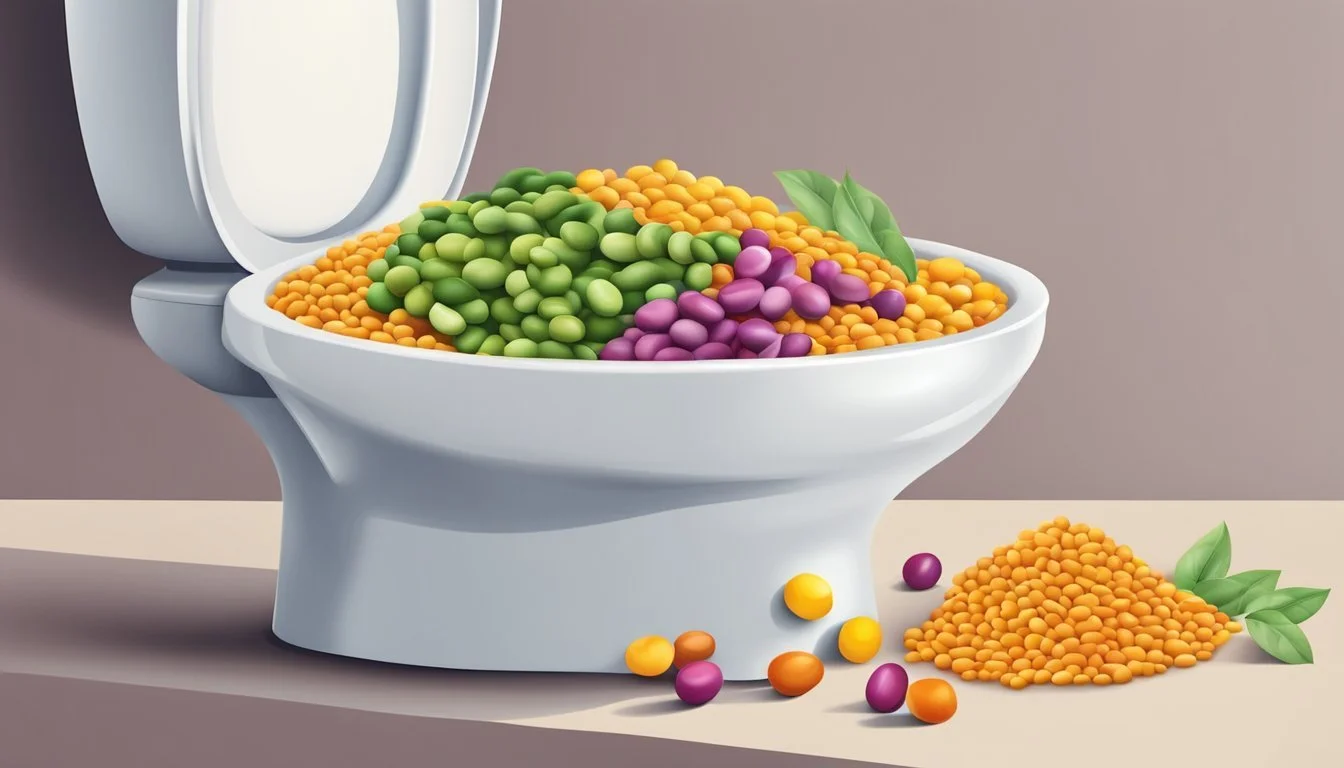Fiber-Rich Foods to Promote Healthy Digestion and Regularity
Maintaining a healthy digestive system is key to overall wellness, and diet plays a crucial role in this. Many foods can promote bowel regularity and ease constipation, providing relief and comfort for those experiencing digestive issues. Choosing the right foods can help stimulate bowel movements and support a healthy digestive tract.
Incorporating a variety of fiber-rich foods, hydrating fruits, and fermented products into your diet can significantly aid in improving bowel movements. Identifying which foods can help you poop can be a natural and effective way to address constipation without relying on medication.
1) Prunes
Prunes, or dried plums, are well-known for their ability to aid digestion. They contain high levels of dietary fiber, with one prune providing about 1 gram of fiber.
The fiber in prunes helps to add bulk to the stool, which can promote regular bowel movements. Additionally, prunes contain sorbitol, a type of sugar alcohol that has a natural laxative effect.
Research suggests that consuming 5 to 6 prunes daily can be beneficial for bowel health. This amount has been shown to help prevent constipation and promote overall digestive health.
Prunes also work as prebiotics, which means they feed the beneficial bacteria in the gut. This can further support a healthy digestive system by improving gut microbiome diversity.
Including prunes in the diet is simple. They can be eaten as a snack, added to cereals, or mixed into sauces. This makes them an easy and effective way to help maintain regular bowel movements.
2) Kiwi
Kiwi is a small fruit packed with fiber, making it a natural aid for digestion and relieving constipation. This fibrous content helps to form stool bulk, which stimulates bowel movements.
Two small kiwis contain twice the fiber of an orange, providing a substantial boost for gut health. Eating the skin of the kiwi can further enhance its fiber content.
In addition to fiber, kiwi contains actinidine, an enzyme that aids in digestive processes and alleviates symptoms like indigestion and abdominal discomfort.
Kiwi is also known to be gentler on the stomach compared to other popular options like prunes or psyllium. This makes it a suitable choice for those who experience gas issues with other high-fiber foods.
Having a kiwi or two daily can contribute significantly to maintaining regular bowel movements and improving overall digestive health.
3) Flaxseeds
Flaxseeds are a beneficial addition to the diet for those seeking to improve their bowel regularity. They are rich in dietary fiber, essential for promoting healthy digestion.
Ground flaxseeds are particularly effective at alleviating constipation. They contain approximately 1.91 grams of fiber per tablespoon, which helps bulk up stools and promotes regular bowel movements.
Flaxseeds also contain a good balance of soluble and insoluble fibers. Insoluble fibers add bulk to the stool and stimulate the digestive system, aiding in more efficient and comfortable bowel movements.
Including one to four tablespoons of ground flaxseed in daily meals can significantly ease constipation. They can be easily incorporated into smoothies, yogurt, oatmeal, or baked goods.
For maximum benefit, it's essential to consume ground flaxseeds rather than whole seeds. Whole flaxseeds might pass through the digestive system undigested, providing little relief.
In addition to fiber, flaxseeds offer omega-3 fatty acids, but flaxseed oil lacks the fiber content necessary to aid in bowel movements. Combining flaxseeds with adequate hydration can further enhance their efficacy in relieving constipation.
4) Whole-Grain Bread
Whole-grain bread is an excellent source of dietary fiber. It helps maintain regular bowel movements by adding bulk to the stool. Each slice of 100% whole-wheat bread typically contains 2 to 3 grams of fiber, making it an easy and effective option for boosting fiber intake.
Incorporating whole-grain bread into meals can be simple. A sandwich made with whole-grain bread can be further enhanced by adding fiber-rich vegetables or beans. This combination can increase the fiber content, promoting better digestion and preventing constipation.
The fiber in whole-grain bread is primarily insoluble, which means it doesn't dissolve in water. Instead, it travels through the digestive system, helping to move waste along more smoothly. This functional benefit is crucial for those looking to ease bowel movements.
For individuals dealing with constipation, switching to whole-grain bread from refined grain bread can make a noticeable difference. It's a small change that can have significant impacts on digestive health. Regular consumption of whole-grain bread supports the overall goal of achieving consistent and comfortable bowel movements.
5) Legumes
Legumes play a significant role in promoting healthy digestion. They provide a rich source of both soluble and insoluble fibers, which help regulate bowel movements.
Beans, lentils, and peas contain magnesium, an essential mineral for muscle function, including the muscles of the digestive tract. This can help in reducing constipation.
One noteworthy aspect of legumes is their ability to add bulk to the stool. This bulk makes it easier for waste to move through the intestines.
Soluble fiber in legumes absorbs water, forming a gel-like substance that facilitates smoother bowel movements. This helps in preventing the stool from becoming too hard or dry.
For those seeking relief from constipation, incorporating a variety of legumes into meals is highly beneficial. Different types offer slightly different fiber profiles, ensuring a well-rounded intake.
6) Chia Seeds
Chia seeds are a powerful food when it comes to promoting digestive health. Rich in soluble fiber, they help form a gel-like substance in the gut, which aids in passing stool more smoothly.
Two tablespoons of chia seeds contain about 7 grams of fiber. This is significant because fiber adds bulk to the stool, easing bowel movements.
One of the key benefits is their ability to absorb water. When soaked, chia seeds expand and become gelatinous, which can help to stimulate the intestines.
Incorporating chia seeds into the diet is simple. They can be added to smoothies, yogurt, or even sprinkled over salads. Some people prefer to create a chia seed drink mixed with water and lemon juice for an "internal shower" effect.
For those struggling with constipation, chia seeds offer a natural and effective solution. They are not only beneficial for digestion but also versatile for various recipes and easy to include in daily meals.
7) Broccoli
Broccoli is a powerful vegetable known for its high fiber content, which aids in digestion. Specifically, broccoli is rich in both soluble and insoluble fibers. Insoluble fiber adds bulk to stool, making it easier to pass, while soluble fiber helps draw water into the intestines, promoting smoother bowel movements.
One cup of raw broccoli typically contains around 2.4 grams of fiber. This makes it an excellent choice for those looking to improve their digestive health. Additionally, broccoli is high in water content, which further aids in easing constipation.
Eating broccoli regularly can help maintain a healthy gut. Steaming or lightly cooking broccoli helps preserve its fiber content and nutrients. Broccoli can be easily added to various dishes, including salads, soups, and stir-fries, making it a versatile option for meals.
Incorporating broccoli into the diet is straightforward and offers multiple health benefits, particularly for those struggling with constipation. Its combination of fiber and water content makes it an effective food for promoting regular bowel movements.
8) Pears
Pears are a helpful fruit for those looking to alleviate constipation. They are rich in dietary fiber, specifically insoluble fiber, which can aid in adding bulk to stools and promoting regular bowel movements.
Each pear also contains a high water content, further aiding digestion and helping to soften stools.
Pears can be eaten fresh, added to salads, or included in desserts. They are versatile and can fit into various meals and snacks, making them an easy addition to any diet focused on improving digestive health.
With their combination of fiber and hydration, pears are an effective choice for improving regularity and easing constipation.
9) Spinach
Spinach is a leafy green vegetable rich in magnesium. Magnesium is known to stimulate the muscles in the bowels, promoting bowel regularity. This makes it a useful food for relieving constipation.
Apart from magnesium, spinach contains fiber, although not as much as other vegetables like broccoli. The fiber content in spinach, particularly its insoluble fiber, aids in digestion and helps to ease bowel movements.
Incorporating spinach into the diet can be simple. It can be juiced, sautéed in olive oil, or added to various dishes. Consuming it regularly can help keep the digestive system functioning smoothly.
Cooked spinach is especially effective, as cooking can concentrate the nutrients. A cup of cooked spinach contains a significant percentage of the daily value of magnesium, making it a potent option for digestive health.
10) Sweet Potatoes
Sweet potatoes are a valuable addition to a diet aimed at improving digestion due to their high content of insoluble fiber.
Insoluble fibers in sweet potatoes add bulk to stools, which helps move the digestive process along efficiently. This can be particularly beneficial for those experiencing constipation.
Beyond fiber, sweet potatoes are rich in vitamins and nutrients that support overall health. They provide vitamins A and C, along with potassium, which can contribute to regular bowel movements.
Incorporating sweet potatoes into meals is simple. They can be baked, mashed, or even added to soups and stews. This versatility makes them an easy-to-use ingredient for those looking to boost their fiber intake.
How Dietary Fiber Aids Digestion
Dietary fiber is essential for digestive health, helping to regulate the body's use of sugars, keep hunger in check, and maintain regular bowel movements. Understanding the different types of fiber and their respective benefits, along with knowing the recommended intake, is key to using fiber effectively.
Types of Fiber: Soluble and Insoluble
Soluble fiber dissolves in water forming a gel-like substance. This type of fiber can be found in foods like oats, beans, and chia seeds. It slows down digestion, helping to reduce blood sugar spikes and manage cholesterol levels.
Insoluble fiber does not dissolve in water. Found in whole grains, nuts, and vegetables like artichokes, it adds bulk to stool, which helps food pass more quickly through the digestive system, preventing constipation.
Soluble fiber:
Lowers cholesterol
Stabilizes blood glucose levels
Found in: oats, beans, chia seeds
Insoluble fiber:
Adds bulk to stool
Prevents constipation
Found in: whole grains, nuts, vegetables
Recommended Daily Intake of Fiber
The recommended daily intake of fiber varies by age and gender:
Men aged 50 or younger should aim for 38 grams per day.
Women aged 50 or younger should aim for 25 grams per day.
For adults over 50, the recommendation is slightly lower:
Men should get 30 grams per day.
Women should get 21 grams per day.
Meeting these guidelines can help maintain digestive health and prevent issues like constipation. Incorporating a variety of fiber-rich foods like fruits, vegetables, beans, and whole grains will help achieve these goals.
Hydration and Its Role in Digestion
Adequate hydration is essential for smooth digestive processes and maintaining stool consistency. The interplay between water intake and electrolytes is crucial for optimizing gut health.
Water Consumption and Stool Consistency
Water aids in moving food through the digestive system efficiently. Without sufficient water, the large intestine absorbs excess water from stool, leading to hard, dry stools and constipation. Drinking adequate amounts of water helps soften stool, making bowel movements smoother and more frequent.
Key Points:
Water helps in breaking down food and speeding up digestion.
Drinking eight to nine glasses of water daily can improve stool consistency.
Chronic dehydration is a common cause of constipation.
Electrolytes and Gut Health
Electrolytes like sodium, potassium, and chloride also play a vital role in digestion by ensuring proper muscle function in the gut. They help maintain the right balance of fluids in and out of cells. An imbalance can disrupt digestive processes, leading to issues like bloating and constipation.
Key Points:
Sodium and potassium regulate fluid balance and nerve function.
Chloride aids in producing stomach acid essential for digestion.
Include foods rich in electrolytes, such as bananas and avocados, to support gut health.




